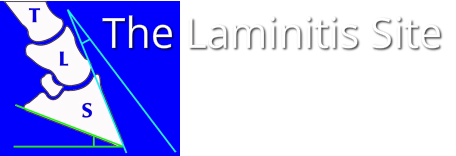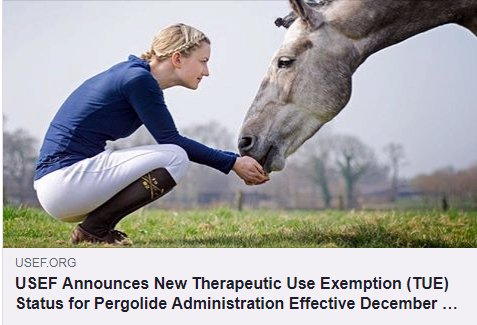The FEI continue to class pergolide as a prohibited substance - controlled medication. All members of the equestrian community are welcome to submit a suggested change to the Equine Prohibited Substances List - if you feel that the FEI should review their classification of pergolide/Prascend for horses diagnosed with PPID, complete and return the FEI Equine Prohibited Substances List submission form.
|
From 01 December 2018, horses competing in the USA under USEF rules can apply for a Therapeutic Use Exemption (TUE) for pergolide after submitting proof of diagnosis. This is a great step forward for the many horses with PPID that continue to compete. See USEF Announces New Therapeutic Use Exemption (TUE) Status for Pergolide Administration Effective December 1, 2018.
The FEI continue to class pergolide as a prohibited substance - controlled medication. All members of the equestrian community are welcome to submit a suggested change to the Equine Prohibited Substances List - if you feel that the FEI should review their classification of pergolide/Prascend for horses diagnosed with PPID, complete and return the FEI Equine Prohibited Substances List submission form.
0 Comments
A molasses-flavoured pergolide paste that can be given in small doses (less than 0.5 mg) has been tested and although not yet licensed may be available in the UK through a horse's vet.
David Rendle presented his research Efficacy of a novel palatable pergolide paste formulation for the treatment of PPID in ponies at the BEVA conference in September 2018. Rendle suggested that the only form of pergolide currently licensed for horses in the UK, Prascend, is not always eaten readily and can be difficult to split and administer below half a tablet. A molasses-flavoured pergolide paste from BOVA UK that can be given in small doses was given to 19 ponies who had not responded well to Prascend, and their clinical records reviewed. They were considered to have PPID if their ACTH concentration was >50 pg/ml in July or >100 pg/ml from August to October. All the ponies were examined after 1 and 6 months of treatment and doses adjusted if necessary according to season. ACTH concentrations improved significantly and returned to normal in 74% of the ponies, clinical signs showed some improvement but some clinical signs either did not improve or became worse. 1 pony refused to eat the paste and 2 ponies went off their feed but this resolved when the dose was reduced. The BOVA pergolide paste is currently not licensed, but may be used through the medicines cascade if Prascend (currently the only licensed form of pergolide) cannot be used (e.g. because it does not appear to be effective or causes significant side effects). The paste is available to horses in the UK through their vet. It may be possible to export to other countries if a vet in that country is prepared to import it (it cannot be distributed to anyone other than a vet). Rendle DI, Frost R, Byrne A Efficacy of a novel palatable pergolide paste formulation for the treatment of pituitary pars intermedia dysfunction (PPID) in ponies EVJ Sept 2018 Vol 50, Issue S52 Clinical Research Abstracts of the BEVA Congress September 2018 P 12-13 https://doi.org/10.1111/evj.16_13008 Palatable pergolide paste for PPID: BEVA award for Rendle presentation on clinical research into new treatment option for "equine cushings disease" - The Hoof Blog Fran Jurga November 2018 |
News
What's new in research New Dengie Laminitis Brochure uses TLS photos WHW new laminitis leaflet2020 Global Equine Endocrine Symposium proceedings Articles about feet December 2019 Autumn Laminitis with Danica Pollard Free ACTH Testing Do all IR/EMS horses have laminitis? Clinical signs of PPID may vary with location Velagliflozin - preventative treatment for endocrinopathic laminitis? USEF allows pergolide to be taken by competing horses Pergolide molasses-flavoured paste available in UK NEHS 2018 Risk factors for EMS/Endocrinopathic Laminitis Seasonal rise in pituitary hormonesPPID - weekly ACTH cutoffs now being used Sole Support Do you CARE about laminitis? Pituitary Pars Intermedia Dysfunction - The Arabian Magazine EMS & Insulin Dysregulation - The Arabian Magazine Laminitis and the Feet - The Arabian Magazine The Arabian Magazine Laminitis article Paddock Paradise in French New EEG Recommendations for the diagnosis and treatment of PPID Archives
February 2024
Categories |


 RSS Feed
RSS Feed